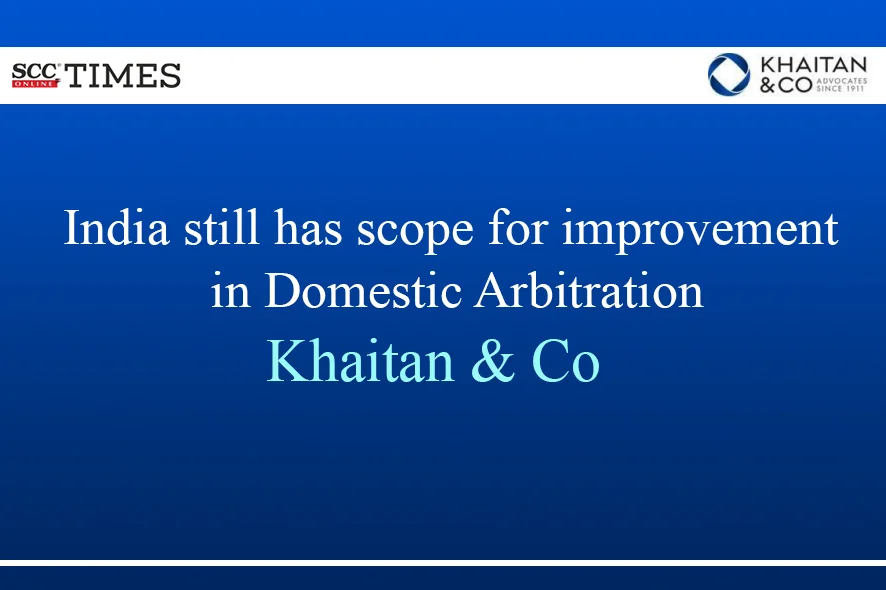Mumbai, 21 March 2024: Premier full service commercial law firm Khaitan & Co recently conducted a survey entitled ‘Current Trends in Domestic Arbitration in India’ in which they polled sophisticated and experienced users of domestic arbitration in India, of whom around 65% were inhouse counsel. The survey results provide unique insights into the operation of domestic arbitration in the country from a user perspective.
The Khaitan & Co survey is significant, both domestically and internationally, because arbitration is the preferred mechanism for dispute resolution in commercial contracts in India. Arbitration is crucial for everyone doing business in India, whether they are a local or foreign firm. However, the survey highlights a divide between the expectations of parties and the present reality of the arbitration process.
The Indian Government has been very focused on improving the system for domestic arbitration in India for more than two decades and significant improvements have been made because of those efforts. As late as last year, in recognition that further reform is required, the government established an expert committee (Vishwanathan Committee) with wide terms of reference to review the operation of arbitration laws in India and further systemic changes are expected soon. The government is committed to an effective domestic arbitration system as a critical element of the ease of doing business in India.
Haigreve Khaitan, Partner, Khaitan & Co said, “Arbitration is an efficient and effective dispute resolution mechanism of critical importance to Indian business, foreign investment in India, the Indian economy, and the rule of law. Both local and foreign investors embrace effective and efficient dispute resolution in commercial contracts as being fundamental to doing business in India and there is increasing interest with the massive foreign investment. We believe that it was timely to do a survey on domestic arbitration in India because it is practically relevant to many Indians and their businesses as well as foreign investors doing business in India.”
The Khaitan & Co survey focused on the experience of parties to arbitration proceedings, rather than advocates, lawyers or other experts involved in domestic arbitration in India so that the survey results would reflect the perspective of the primary users of the system.
Key findings:
-
Arbitration is the preferred method of dispute resolution over litigation because of the speed of resolution, confidentiality, cost effectiveness, and process with speed of resolution being the most important.
-
Regarding the experience of parties involved in domestic arbitration, 40% of respondents confirmed that they are satisfied with domestic arbitration as a dispute resolution mechanism whilst 60% of respondents expressed either dissatisfaction or ambivalence, indicating significant scope for improvement in meeting the expectations of parties from the arbitration process66% of respondents considered that the mandatory time limits in the arbitration process, imposed in the 2015 amendments to the Arbitration Act, are not being adhered to.
-
Most arbitrations are taking 24 to 36 months to complete instead of 12 months, which is what parties expect.
-
59% of respondents considered that arbitrations should be completed within 12 months.
-
A large majority of respondents intend to use domestic arbitration in the future for both small disputes (75%) and large disputes (85%).
-
More than 80% of respondents considered that emergency arbitration measures for urgent or time sensitive issues should be provided for and 40% considered that such emergency arbitration measures should be completed within 30 days.
-
Despite significant efforts to promote institutional arbitration ad hoc arbitration remains popular, with almost half of survey respondents.
-
Whilst institutional arbitration is more favourably considered by respondents than it has been, over 50% of respondents still intend to use ad hoc arbitration in the future which suggests that the arbitral institutions still have some work to do to win acceptance in India.
-
Simplification of award enforcement, penal consequences for non-compliance with time limits, and special court benches to deal exclusively with arbitration related matters were most favoured measures for improvement in the domestic arbitration process.
The release of the survey coincides with release of the much-awaited recommendations of the Vishwanathan Committee which were recently submitted to the Indian government. The committee was charged with the responsibility to investigate the operation of arbitration laws in India and to recommend reforms. The Khaitan & Co survey serves as valuable user feedback highlighting the pressing need for specific reforms in domestic arbitration to meet the reasonable expectations of users.
About Khaitan & Co
Khaitan & Co is a top tier and full-service law firm with over 1000 legal professionals, including over 240 Partners and Counsel, and presence in India and Singapore. With more than a century of experience in practicing law, we offer end-to-end legal solutions in diverse practice areas to our clients across the world. We have a team of highly motivated and dynamic professionals delivering outstanding client service and expert legal advice across a wide gamut of sectors and industries. To know more, visit www.khaitanco.com The Fintech practice of the firm envisions to emulate the Firm’s ambition of being the trusted advisor to its clients on all aspects of Fintech offerings, including regulatory, compliances, product advisory, disputes, investments, partnerships, and licensing / approvals.
Media Contacts
Avantika Ghildyal
Lead – Corporate Communications
Email – avantika.ghildyal@khaitanco.com
Mobile – +91-9920805306
Jasleen Kaur Batra
Manager – Corporate Communications
Email – jasleen.batra@khaitanco.com
Mobile – +91-9930593081
Kopal Jain
Account Manager, Edelman
Email – Kopal.jain@edelman.com
Mobile – +91 8109352502






